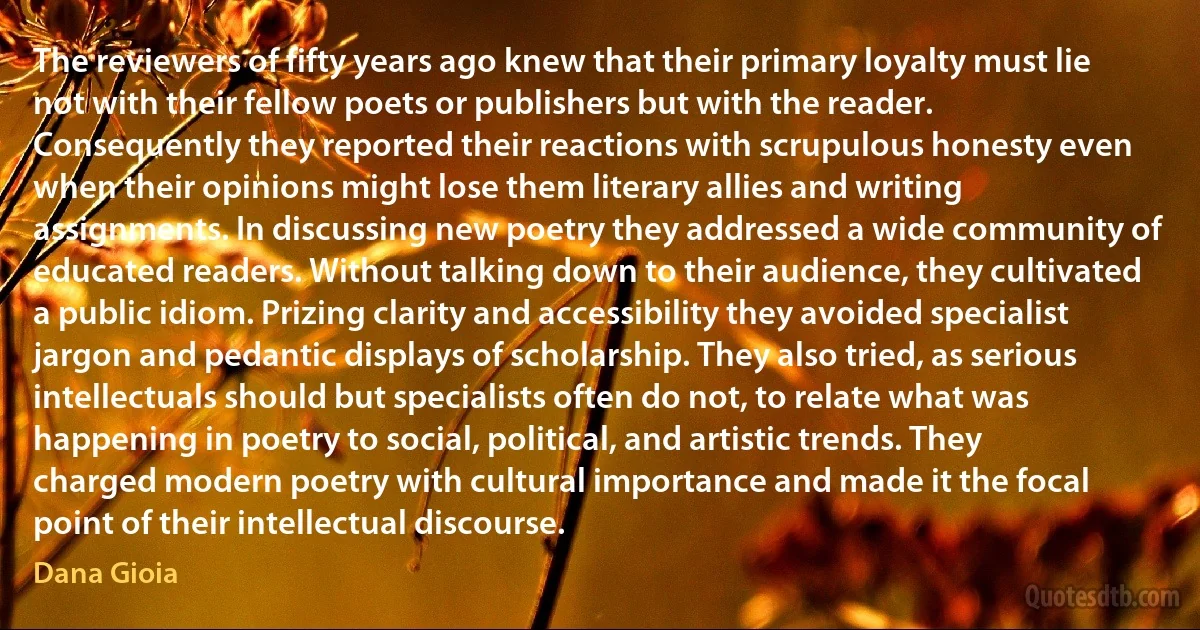
The reviewers of fifty years ago knew that their primary loyalty must lie not with their fellow poets or publishers but with the reader. Consequently they reported their reactions with scrupulous honesty even when their opinions might lose them literary allies and writing assignments. In discussing new poetry they addressed a wide community of educated readers. Without talking down to their audience, they cultivated a public idiom. Prizing clarity and accessibility they avoided specialist jargon and pedantic displays of scholarship. They also tried, as serious intellectuals should but specialists often do not, to relate what was happening in poetry to social, political, and artistic trends. They charged modern poetry with cultural importance and made it the focal point of their intellectual discourse.
Dana GioiaRelated topics
accessibility allies clarity fellow fifty focal honesty idiom intellectual jargon lie lose might point primary public scholarship should talking try wide yearsRelated quotes
I believe in limited government. I believe that government should be limited in many ways, and what I am going to emphasize is only an intellectual thing. I don't want to talk about everything at the same time. Let's take a small piece, an intellectual thing.No government has the right to decide on the truth of scientific principles, nor to prescribe in any way the character of the questions investigated. Neither may a government determine the aesthetic value of artistic creations, nor limit the forms of literary or artistic expression. Nor should it pronounce on the validity of economic, historic, religious, or philosophical doctrines. Instead it has a duty to its citizens to maintain the freedom, to let those citizens contribute to the further adventure and the development of the human race.

Richard Feynman
The mania for self-observation and self-admiration in literature and the view that a work is the more true and the more convincing, the more directly the author reveals himself in it, are part of the intellectual inheritance of Rousseau. In the next hundred to hundred and fifty years everything of importance in European literature is stamped with this subjectivism. Not only Werther, René, Obermann, Adolphe, Jacopo Ortis, are among the successors of Saint-Preux, but also the heroes in later novels- from Balzac's Lucien de Rubempré, Stendhal's Julien Sorel, Flaubert's Frédéric Moreau and Emma Bovary to Tolstoy's Pierre, Proust's Marcel and Thomas Mann's Hans Castorp-are derived from it. They all suffer from the discrepancy between dream and reality and are the victim of the conflict between their illusions and practical, commonplace, middle-class life.

Arnold Hauser
Women have been discouraged from genres such as sculpture that require studio training or expensive materials. But in philosophy, mathematics, and poetry, the only materials are pen and paper. Male conspiracy cannot explain all female failures. I am convinced that, even without restrictions, there still would have been no female Pascal, Milton, or Kant. Genius is not checked by social obstacles: it will overcome. Men's egotism, so disgusting in the talentless, is the source of their greatness as a sex. [...] Even now, with all vocations open, I marvel at the rarity of the woman driven by artistic or intellectual obsession, that self-mutilating derangement of social relationship which, in its alternate forms of crime and ideation, is the disgrace and glory of the human species.

Camille Paglia
A long decade ago economic growth was the reigning fashion of political economy. It was simultaneously the hottest subject of economic theory and research, a slogan eagerly claimed by politicians of all stripes, and a serious objective of the policies of governments. The climate of opinion has changed dramatically. Disillusioned critics indict both economic science and economic policy for blind obeisance to aggregate material "progress," and for neglect of its costly side effects. Growth, it is charged, distorts national priorities, worsens the distribution of income, and irreparably damages the environment. Paul Erlich speaks for a multitude when he says, "We must acquire a life style which has as its goal maximum freedom and happiness for the individual, not a maximum Gross National Product."

James Tobin
Print also created new literary forms and altered ideas of literary style. Medieval poetry was conceived for the ear, and each poem had to stand the test of recitation. In addition, medieval audiences were not always interested in the poet himself, since his work was known to them only through the interpretations of minstrels, who frequently rephrased poems to suit their own image and images. The printed page changed these conditions. Slowly, the printed poet came into a new relationship with his reader. He learned not to be so repetitive as his predecessors since a reader could be depended upon to return as often as needed to uncompromised passages. ...After the flowering of dramatic poetry during the Elizabethan Age, the printed page substituted for the theater, and millions of children came to know Shakespeare only through this form.

Neil Postman
